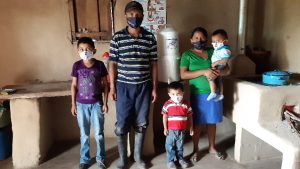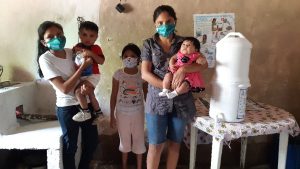In July, PWW announced our participation as a partner in a comprehensive UNICEF-sponsored WASH project located in central Honduras, called “Humanitarian WASH Response to Communities Affected by Drought in the Dry Corridor in Honduras.” (read announcement)
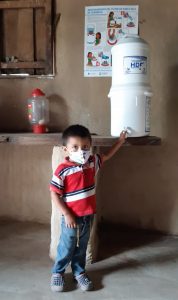 In addition to working in schools in this region, PWW is providing extensive hygiene education training to 1,134 families as well as installing clean water filters in their homes. Due to the limited availability of water in this region, a ceramic filter was selected as the water filter technology for family homes.
In addition to working in schools in this region, PWW is providing extensive hygiene education training to 1,134 families as well as installing clean water filters in their homes. Due to the limited availability of water in this region, a ceramic filter was selected as the water filter technology for family homes.
The ceramic filter is a home treatment filtration technology that eliminates microorganisms from the source water. Ceramic filters are often presented as probe-shaped filter cartridges, fitted vertically in plastic containers whose capacity can reach 20 or 30 liters. The filter element (called a “candle”) is infused with fine colloidal silver particles that act as disinfectant and prevent the growth of bacteria on the filter.
The filtration process works through gravity. No energy is required for it to work. Families simply pour water into the filter each day. To maintain effectiveness, the filter requires regular cleaning and the filter elements (two candles in the version we are installing) require annual replacement.
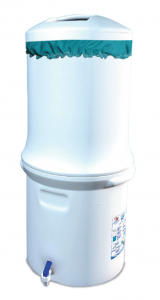 The two-candle ceramic filter works in four stages:
The two-candle ceramic filter works in four stages:
- Pour the water into the container at least once per day. The water passes through the microporous ceramic material filter that retains solid particles and impurities.
- Water passes through the inner colloidal silver layer, eliminating bacteria.
- Water passes through activated carbon, which reduces odors, flavors, and chlorine.
- Water arrives in the lower container clean and safe for consumption.
Water can be left inside the lower container until it is consumed. Based on individual family needs, once filtered, the water can be stored using safe storage practices taught to all families prior to installation.
Dengue fever is prolific in this region of Honduras. Families will learn the important practices of safe water storage in their homes and on their properties to protect themselves and combat the spread of this disease.
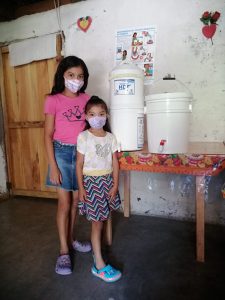 Families also learn how the ceramic filter works and how to maintain them. They receive a poster that provides pictorial instruction (click here to view). Additionally, they will all have assigned Community Agents to further support them, as needed.
Families also learn how the ceramic filter works and how to maintain them. They receive a poster that provides pictorial instruction (click here to view). Additionally, they will all have assigned Community Agents to further support them, as needed.
PWW will train around 200 Community Agents (CA) who serve as an extension of the PWW team. Each CA is assigned 3-5 families that they will visit regularly for follow-up and support. CA’s participate in family hygiene education programs. They learn the routes for transmission of pathogens and preventative practices. They also learn the detailed workings of the ceramic filters, including how to install and maintain the filters and how to troubleshoot problems. After installation, they are in regular communication with the PWW team for any additional training and/or support.
PWW is providing all families with training about COVID-19 and the critical hygiene and personal protection practices to keep families safe. Included in this project is the dissemination of reusable face masks with training focused on how to properly wear and care for the masks.
Below are photos of just a few of the grateful families, no longer waiting for safe water at their homes!


